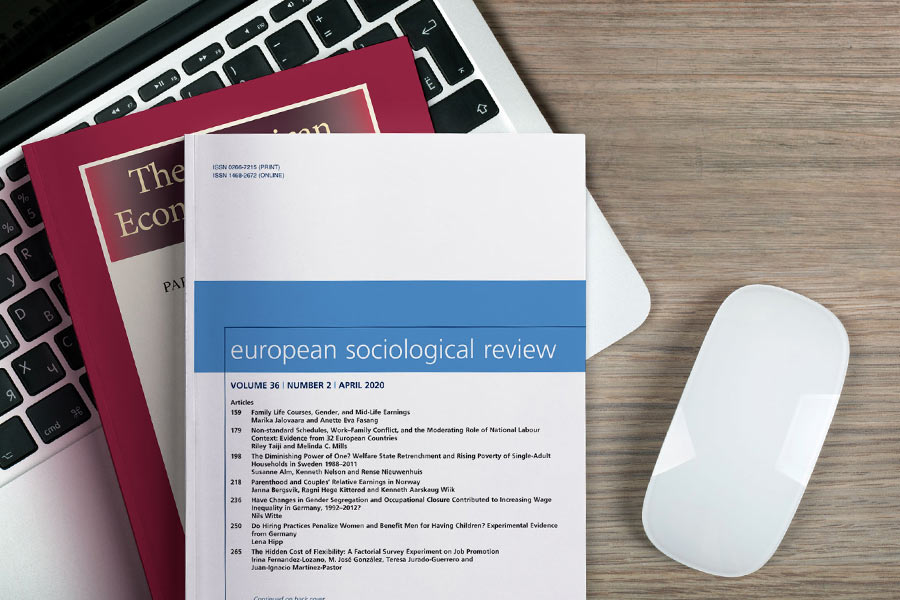Total hits 17.461
-
Einschätzung des IAB zur wirtschaftlichen Lage - August 2024
Gartner, H. & Weber, E. (2024): Einschätzung des IAB zur wirtschaftlichen Lage - August 2024. In: IAB-Forum No. 30.08.2024. DOI:10.48720/IAB.FOO.20240830.01
-
The impact of political connections on firm outcomes: Evidence from Germany
Diegmann, A., Pohlan, L. & Weber, A. (2024): The impact of political connections on firm outcomes: Evidence from Germany. (VoxEU columns / Centre for Economic Policy Research), London, o. p..
-
Vocational Rehabilitation in Times of the Covid-19 Pandemic
Rauch, A. & Reims, N. (2024): Berufliche Rehabilitation in Zeiten der Covid-19-Pandemie. In: Die Rehabilitation, Vol. 63, No. 5, p. 282-288. DOI:10.1055/a-2374-2467
-
Beschäftigungssituation in den Berufen der Kinderbetreuung und -erziehung in Niedersachsen
Wrobel, M., Harten, U. & Berisha, A. (2024): Beschäftigungssituation in den Berufen der Kinderbetreuung und -erziehung in Niedersachsen. (IAB-Regional. Berichte und Analysen aus dem Regionalen Forschungsnetz. IAB Niedersachsen-Bremen 01/2024), Nürnberg, 55 p. DOI:10.48720/IAB.RENSB.2401
-
Betriebliche Berufsausbildung und Weiterbildung in Deutschland
Nimczik, J. (2024): Betriebliche Berufsausbildung und Weiterbildung in Deutschland. Nürnberg, 149 p.
-
Welcome back! The impact of 'return initiatives' on return migration to rural regions
Meister, M., Peters, J. & Rossen, A. (2024): Welcome back! The impact of 'return initiatives' on return migration to rural regions. In: Journal of economic geography, Vol. 24, No. 5, p. 759-784. DOI:10.1093/jeg/lbae028
-
The Impact of Mail, Web, and Mixed-Mode Data Collection on Participation in Establishment Surveys
Küfner, B., Sakshaug, J., Zins, S. & Globisch, C. (2025): The Impact of Mail, Web, and Mixed-Mode Data Collection on Participation in Establishment Surveys. In: Journal of survey statistics and methodology, Vol. 13, No. 1, p. 66-99. DOI:10.1093/jssam/smae033
-
Infrastructure required, skill needed: Digital entrepreneurship in rural and urban areas
Bergholz, C., Füner, L., Lubczyk, M., Sternberg, R. & Bersch, J. (2024): Infrastructure required, skill needed: Digital entrepreneurship in rural and urban areas. In: Journal of Business Venturing Insights, Vol. 22. DOI:10.1016/j.jbvi.2024.e00488
-
Exploring unemployment insurance for the self-employed and platform workers: How to navigate difficult waters? A comparative, conceptual and European perspective
Becker, E., Schoukens, P. & Weber, E. (2024): Exploring unemployment insurance for the self-employed and platform workers: How to navigate difficult waters? A comparative, conceptual and European perspective. In: European Journal of Social Security, Vol. 26, No. 2, p. 97-108. DOI:10.1177/13882627241267993
-
Enriching administrative data using survey data and machine learning techniques
Kunaschk, M. (2024): Enriching administrative data using survey data and machine learning techniques. In: Economics Letters, Vol. 243. DOI:10.1016/j.econlet.2024.111924
-
Means-Tested Welfare Benefits and Subjective Well-Being Through Time: Does Clients' Life Satisfaction Recover?
Nivorozhkin, A. & Promberger, M. (2025): Means-Tested Welfare Benefits and Subjective Well-Being Through Time: Does Clients' Life Satisfaction Recover? In: Social Policy and Administration, Vol. 59, No. 5, p. 705-716. DOI:10.1111/spol.13078
-
Persönliche Empfehlungen tragen dazu bei, betriebliche Vorbehalte gegenüber Langzeitarbeitslosen abzubauen (Serie Arbeitskräftesicherung )
Kubis, A. & Popp, M. (2024): Persönliche Empfehlungen tragen dazu bei, betriebliche Vorbehalte gegenüber Langzeitarbeitslosen abzubauen (Serie Arbeitskräftesicherung ). In: IAB-Forum No. 21.08.2024 Nürnberg. DOI:10.48720/IAB.FOO.20240821.01
-
Six years after the EU-Turkey Agreement: A quantitative assessment of the living conditions of Syrians in Turkey
Gundacker, L., Hertner, L. & Ruhnke, S. (2024): Six years after the EU-Turkey Agreement: A quantitative assessment of the living conditions of Syrians in Turkey. (IAB-Forschungsbericht 18/2024), Nürnberg, 57 p. DOI:10.48720/IAB.FB.2418
-
Digitalisierung der Arbeitswelt: Mögliche Auswirkungen auf den Arbeitsmarkt in Hessen – Aktualisierung 2022
Burkert, C., Röhrig, A. & Jahn, D. (2024): Digitalisierung der Arbeitswelt: Mögliche Auswirkungen auf den Arbeitsmarkt in Hessen – Aktualisierung 2022. (IAB-Regional. Berichte und Analysen aus dem Regionalen Forschungsnetz. IAB Hessen 02/2024), Nürnberg, 26 p. DOI:10.48720/IAB.REH.2402
-
Ökologische Transformation: Nicht alle Regionen können Beschäftigungsverluste in energieintensiven Branchen anderweitig ausgleichen (Serie: Digitale und ökologische Transformation)
Vetterer, N. & Haas, A. (2024): Ökologische Transformation: Nicht alle Regionen können Beschäftigungsverluste in energieintensiven Branchen anderweitig ausgleichen (Serie: Digitale und ökologische Transformation). In: IAB-Forum No. 14.08.2024 Nürnberg. DOI:10.48720/IAB.FOO.20240814.01
-
IAB Establishment Panel: Highest share of unfilled apprenticeships
Fitzenberger, B., Leber, U. & Schwengler, B. (2024): IAB-Betriebspanel: Rekordhoch beim Anteil der unbesetzten Ausbildungsstellen. (IAB-Kurzbericht 16/2024), Nürnberg, 8 p. DOI:10.48720/IAB.KB.2416
-
On the Draft Act for Modernizing the Social Code, Book III : Statement of the IAB on the Draft Act for Modernizing the Unemployment Insurance and Active Labor Market Policies on 24 July
Anger, S., Bernhard, S., Janssen, S., Leber, U., Lerche, A., Oberfichtner, M., Reims, N., Sandner, M., Schels, B., Senghaas, M., Stephan, G., Toussaint, C. & Tübbicke, S. (2024): Zum Entwurf des SGB-III-Modernisierungsgesetzes. Stellungnahme des IAB zum Referentenentwurf eines Gesetzes zur Modernisierung der Arbeitslosenversicherung und Arbeitsförderung am 24.7.2024. (IAB-Stellungnahme 01/2024), Nürnberg, 19 p. DOI:10.48720/IAB.SN.2401
-
Minijobs as stepping stones to regular employment: overall trends and the role of Midijob reforms
Collischon, M., Herget, A. & Riphahn, R. (2024): Minijobs as stepping stones to regular employment: overall trends and the role of Midijob reforms. In: Journal for labour market research, Vol. 58. DOI:10.1186/s12651-024-00377-8
-
Scarce Workers, High Wages?
Börschlein, E., Bossler, M. & Popp, M. (2024): Scarce Workers, High Wages? (arXiv papers 2408.04508), 72 p. DOI:10.48550/arXiv.2408.04508
-
OnJoB: Die Online-Jobcenter-Befragung Bürgergeld
Bernhard, S., Nützel, U., Osiander, C., Ramos Lobato, P. & Zins, S. (2024): OnJoB: Die Online-Jobcenter-Befragung Bürgergeld. (IAB-Forschungsbericht 17/2024), Nürnberg, 63 p. DOI:10.48720/IAB.FB.2417



